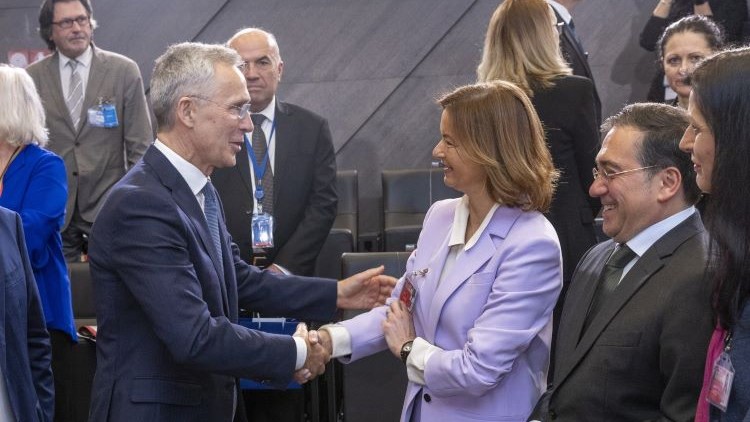Eduardo González
The Minister of Foreign Affairs, José Manuel Albares, defended yesterday in Brussels greater “predictability” in military and financial aid to Ukraine but avoiding “duplicities” between the European Union and NATO.
“Within the EU we have been in favor of predictability in the delivery of funds to Ukraine”, but “what we have to see is what is the best mix of support for Ukraine from all of us, what NATO has to do, what the EU has to do, what we have to do bilaterally,” Albares declared upon his arrival at the ministerial meeting of the Atlantic Alliance, which began yesterday in Brussels and will conclude today. The meeting coincides with the 75th anniversary of the founding of the Alliance and is the first meeting of NATO foreign ministers in which Sweden participates as a full member.
In any case, Albares warned, “the important thing is to maintain the commitment to Ukraine for as long as necessary and that this commitment, which could only be done quickly and urgently in the first moments because it was an unexpected war of aggression, becomes structured and predictable.”
“The important thing is that Ukraine receives everything it needs,” he continued. “But what we should not do, in any case, is duplicate efforts,” he warned. “We must not bilaterally duplicate what can be done better together in the EU and we must not duplicate in NATO what the EU does, of course. They are different organizations, with different purposes,” he added.
The Brussels meeting comes after the proposal raised by NATO Secretary General Jens Stoltenberg to create a multi-year financial fund to support Ukraine. Albares could not confirm the amount that the fund proposed by Stoltenberg would have, but both the ‘Financial Times’ and ‘Bloomberg’ have considered a figure of 100,000 million euros for an initial duration of five years, awaiting approval during the next NATO summit, which will be held in Washington in July. In any case, according to the minister, the important thing is “to make a distribution that is the best for Ukraine.”
During yesterday’s session, Albares held a meeting with the Ukrainian Minister of Foreign Affairs, Dmytro Kuleba, whom he assured that Spain will be “with Ukraine until peace returns and this war of aggression ends,” as reported through the social network X. Likewise, he met with his counterpart from Montenegro, Filip Ivanović, to whom he reiterated Spain’s support for his country’s “European path.”
Jens Stoltenberg
At the end of yesterday’s meeting, Jens Stoltenberg declared at a press conference that the foreign ministers had discussed supporting Ukraine “with a firmer and more lasting basis for the future” and had therefore agreed to “move forward in planning for a greater role for NATO in coordinating security assistance and training.” “Details will take shape in the coming weeks, but make no mistake: Ukraine can count on NATO’s support now and in the long term,” he added.
Upon his arrival at the Alliance headquarters in Brussels, Stoltenberg defended an “institutionalized framework” that guarantees “greater predictability” in support for Ukraine “so that we depend less on voluntary contributions and more on NATO commitments, less on short-term offers and more multi-year commitments.”
The ministers also discussed security challenges in the Alliance’s Southern Neighbourhood, including the persistent threat of terrorism. The heads of state and government are expected to address specific proposals on this point ahead of the summit in Washington. The day concluded with a reception offered by the Secretary of State of the United States, Antony Blinken, on the occasion of the 75th Anniversary of the signing of the Washington Treaty, which established the Atlantic Alliance.
Today the NATO-Ukraine Council will meet at the level of foreign ministers, who will be joined by Dmytro Kuleba. The ministers will also meet with their Indo-Pacific partners and the European Union to discuss enhancing cooperation and the global implications of Russia’s war against Ukraine.





